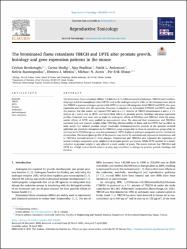The brominated flame retardants TBECH and DPTE alter prostate growth, histology and gene expression patterns in the mouse

Göster/
Tarih
2021Yazar
Bereketoğlu, CeyhunModig, Carina
Pradhan, Ajay
Andersson, Patrik L.
Stasinopoulou, Sotiria
Mitsiou, Dimitra J.
Alexis, Michael N.
Olsson, Per-Erik
Üst veri
Tüm öğe kaydını gösterKünye
Bereketoglu, C., Modig, C., Pradhan, A., Andersson, P. L., Stasinopoulou, S., Mitsiou, D. J., Alexis, M. N., & Olsson, P. E. (2021). The brominated flame retardants TBECH and DPTE alter prostate growth, histology and gene expression patterns in the mouse. Reproductive toxicology (Elmsford, N.Y.), 102, 43–55. https://doi.org/10.1016/j.reprotox.2021.04.002Özet
The brominated flame retardants (BFRs), 1,2-dibromo-4-(1,2 dibromoethyl)cyclohexane (TBECH) and 2,3-dibromopropyl-2,4,6-tribromophenyl ether (DPTE) bind to the androgen receptor (AR). in vitro bioassays have shown that TBECH is a potent androgen agonist while DPTE is a potent AR antagonist. Both TBECH and DPTE alter gene expression associated with AR regulation. However, it remains to be determined if TBECH and DPTE can affect the prostate. For this reason, we exposed CD1 mice to a 1:1 mixture of TBECH diastereomers alpha and beta, a 1:1 mixture of gamma and delta, and to DPTE, and tested their effects on prostate growth, histology and gene expression profiles. Castrated mice were used to study the androgenic effects of TBECH alpha beta and TBECH gamma delta while the antagonistic effects of DPTE were studied in non-castrated mice. We observed that testosterone and TBECH gamma delta increased body and prostate weights while TBECH alpha beta affected neither of them; and that DPTE had no effect on body weight but reduced prostate weight drastically. Histomorphometric analysis of the prostate revealed epithelial and glandular alterations in the TBECH gamma delta group comparable to those in testosterone group while alterations in the TBECH alpha beta group were less pronounced. DPTE displayed androgen antagonist activity reminiscent of castration. The transcription profile of the prostate was altered by castration and exposure to testosterone and to TBECH gamma delta reversed several of these changes. Testosterone and TBECH gamma delta also regulated the expression of several androgen responsive genes implicated in prostate growth and cancer. While DPTE resulted in a drastic reduction in prostate weight, it only affected a small number of genes. The results indicate that TBECH gamma delta and DPTE are of high human health concern as they may contribute to changes in prostate growth, histology and function















